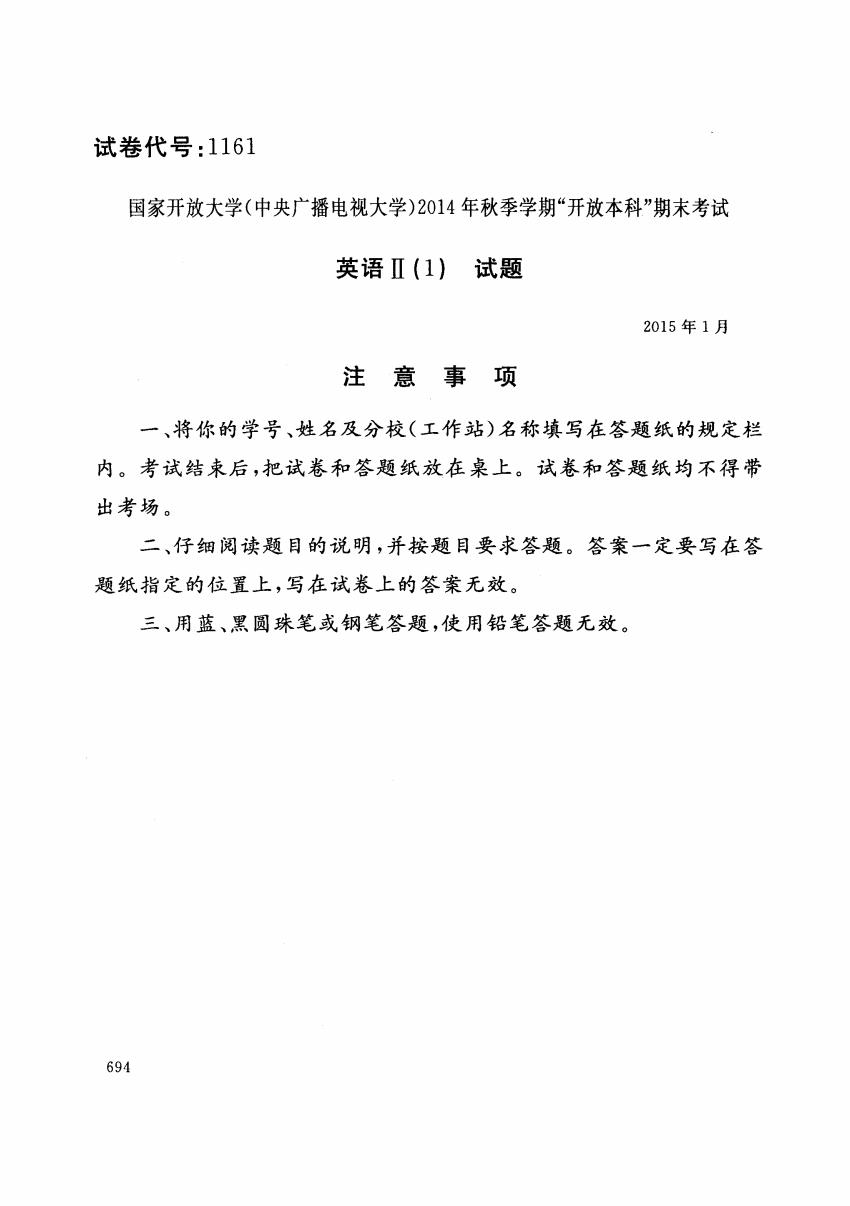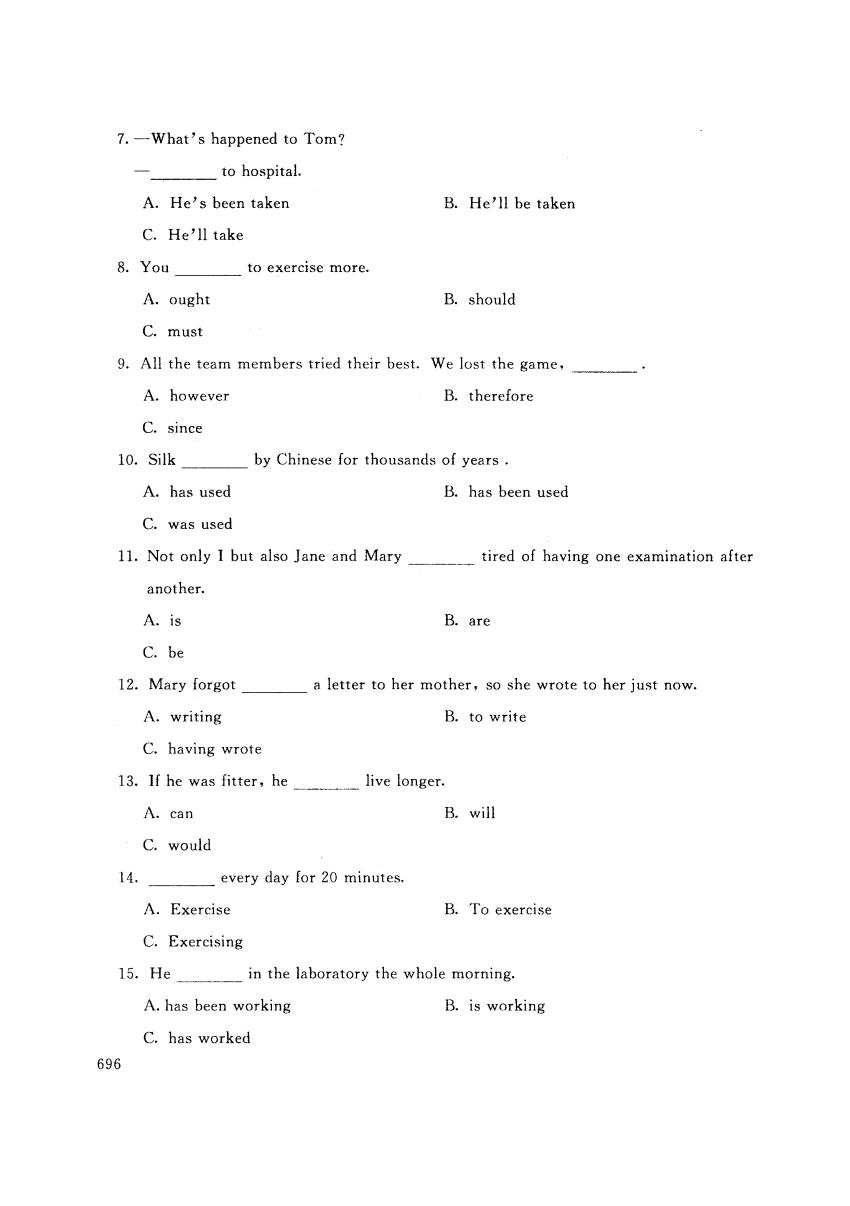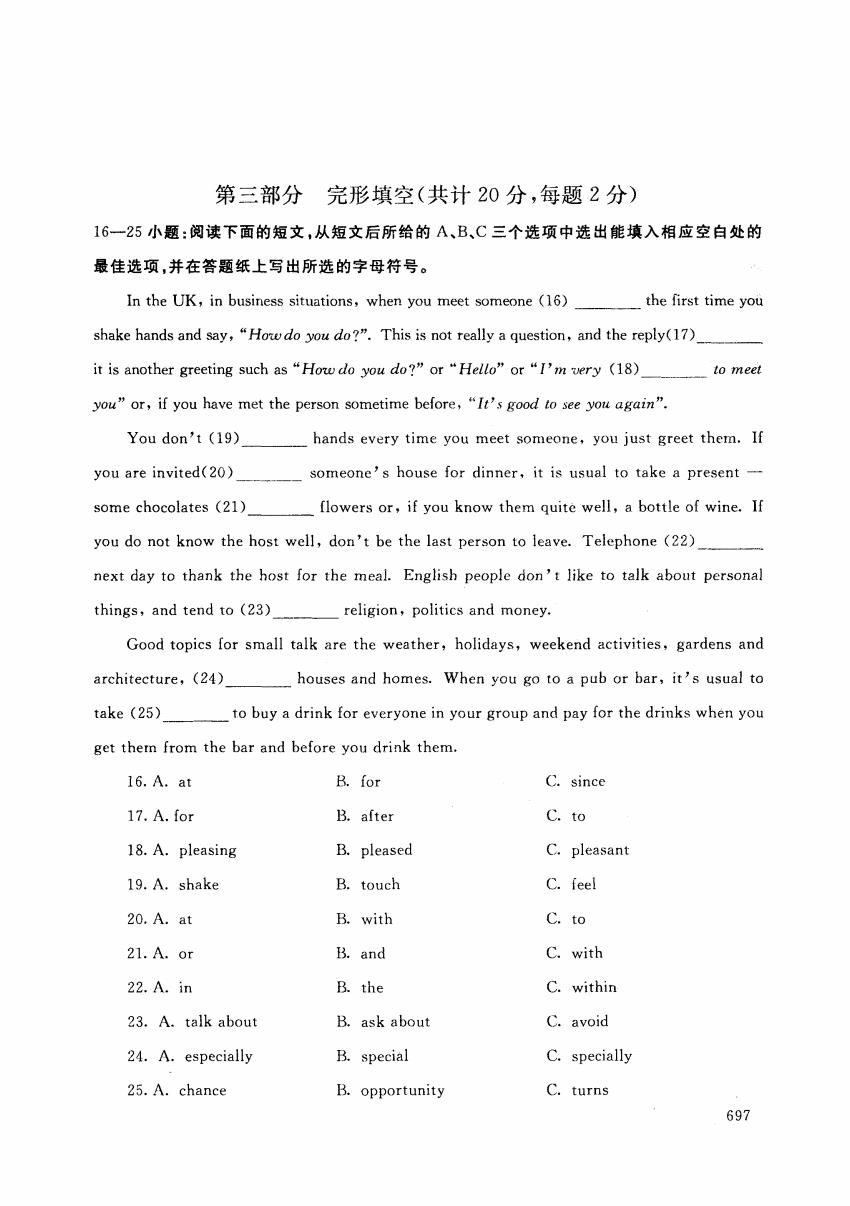
试卷代号:1161 国家开放大学(中央广播电视大学)2014年秋季学期“开放本科”期末考试 英语Ⅱ(1)试题 2015年1月 注意事项 一、将你的学号、姓名及分校(工作站)名称填写在答题纸的规定档 内。考试结束后,把试卷和答题纸放在桌上。试卷和答题纸均不得带 出考场。 二、仔细阅读题目的说明,并按题目要求答题。答案一定要写在答 题纸指定的位置上,写在试卷上的答案无效。 三、用蓝、黑圆珠笔或钢笔答题,使用铅笔答题无效。 694
试卷代号 :1161 国家开放大学(中央广播电视大学)2014 年秋季学期"开放本科"期末考试 英语 11 (1) 试题 2015 注意事项 一、将你的学号、姓名及分校(工作站)名称填写在答题纸的规定栏 内。考试结束后,把试卷和答题纸放在桌上。试卷和答题纸均不得带 出考场。 二、仔细阅读题目的说明,并按题目要求答题。答案一定要写在答 题纸指定的位置上,写在试卷上的答案无效。 三、用蓝、黑圆珠笔或钢笔答题,使用铅笔答题无效。 694

第一部分交际用语(共计10分,每小题2分) 1一5小题:阅读下面的小对话,从A、B、C三个选项中选出一个能填入空白处的最佳选项,并 在答题纸上写出所选的字母符号。 1.-Would you like to have dinner with us this evening? A.OK,but I have to go to a meeting now. B.No,I can't. C.Sorry,but this evening I have to go to the airport to meet my parents. 2.-What's the problem,Harry? A.No problem B.I can't remember where I left my glasses C.No trouble at all 3.-Well,Mary,how are you? A.I'm good B.I'm nice C.I'm fine 4.-What would you like,tea or coffee? A.Yes,I would B.Coffee,please C.It's very nice 5.-May I know your address? 一 A.Sure.Here you are B.I have no idea C.Sorry,I've forgotten 第二部分词汇与结构(20分,每小题2分) 6一15小题:阅读下面的句子,从A、B、C三个选项中选出一个能填入空白处的最佳选项,并在 答题纸上写出所选的字母符号。 6.He is very keen football. A.at B.in C:on 695
第一部分交际用语(共计 10 分,每小题 分) 小题:阅读下面的小对话,从 三个选项中选出一个能填入空白处的最佳选项,并 在答题纸上写出所选的字母符号。 1. - W ould you like to have dinner with us this evening? A. OK , but I have to go to a meeting now. B. No , I can't. C. Sorry , but this evening I have to go to the airport to meet my parents. 2. -What's the problem , Harry? A. No problem B. I can't remember where I left my glasses C. No trouble at all 3. -Well, Mary , how are you? A. I'm good C. I'm fine 4. -What would you like , tea or coffee? A. Yes, I would C. It's very nice 5. - May I know your address? A. Sure. Here you are C. Sorry , l' ve forgotten B. I'm nice B. Coffee , please B. I have no idea 第二部分词汇与结构 (20 分,每小题 分) 15 小题:阅读下面的旬子,从 三个选项中选出一个能填入空白处的最佳选项,并在 答题纸上写出所选的字母符号。 6. He is very keen 一一一一一 football. A. at B. in c.- on 695

7.-What's happened to Tom? to hospital. A.He's been taken B.He'll be taken C.He'll take 8.You to exercise more. A.ought B.should C.must 9.All the team members tried their best.We lost the game, A.however B.therefore C.since 10.Silk by Chinese for thousands of years. A.has used B.has been used C.was used 11.Not only I but also Jane and Mary tired of having one examination after another. A.is B.are C.be 12.Mary forgot a letter to her mother,so she wrote to her just now. A.writing B.to write C.having wrote 13.If he was fitter,he live longer. A.can B.will C.would 14. every day for 20 minutes. A.Exercise B.To exercise C.Exercising 15.He in the laboratory the whole morning. A.has been working B.is working C.has worked 696
7. --What's happened to Tom? to hospital. A. He' s been taken C. He'll take 8. You A. ought C. must to exerClse more. B. He'll taken B. should 9. All the team members tried their best. We lost the game , A. however c.日ince B. therefore 10. Silk 一一一一 by Chinese for thousands of years . A. has used B. has been used C. was used 11. Not only 1 but also ] ane and Mary 一一一一一_ tired of having one examination after another. A. is B. are C. be 12. Mary forgot 一一一一 letter to her mother , so she wrote to her j ust now. A. writing C. having wrote 13. If he was fitter , he 八. can C. would live longer. 14. _ every day for 20 minutes. A. Exercise C. Exercising B. to writ B. will B. To exercise 15. He in the laboratory the whole morning. 696 A. has been working C. has worked B. is working

第三部分完形填空(共计20分,每题2分) 16一25小题:阅读下面的短文,从短文后所给的A、B、C三个选项中选出能填入相应空白处的 最佳选项,并在答题纸上写出所选的字母符号。 In the UK,in business situations,when you meet someone(16) the first time you shake hands and say,"How do you do?".This is not really a question,and the reply(17) it is another greeting such as“How do you do?”or“Hello”or“I'mery(18) to meet you"or,if you have met the person sometime before,"It's good to see you again". You don't (19) hands every time you meet someone,you just greet them.If you are invited(20) someone's house for dinner,it is usual to take a present- some chocolates (21) flowers or,if you know them quite well,a bottle of wine.If you do not know the host well,don't be the last person to leave.Telephone (22) next day to thank the host for the meal.English people don't like to talk about personal things,and tend to (23)religion,politics and money. Good topics for small talk are the weather,holidays,weekend activities,gardens and architecture,(24) houses and homes.When you go to a pub or bar,it's usual to take (25) to buy a drink for everyone in your group and pay for the drinks when you get them from the bar and before you drink them. 16.A.at B.for C.since 17.A.for B.after C.to 18.A.pleasing B.pleased C.pleasant 19.A.shake B.touch C.feel 20.A.at B.with C.to 21.A.or B.and C.with 22.A.in B.the C.within 23.A.talk about B.ask about C.avoid 24.A.especially B.special C.specially 25.A.chance B.opportunity C.turns 697
第三部分完形填空(共计 20 分,每题 分) 16-25 小题:阅读下面的短文,从短文后所给的 三个选项中选出能填入相应空白处的 最佳选项,并在答题纸上写出所选的字母符号。 In the UK, in business situations, when you meet someone (1 6) 一一一一一 the first time you shake hands and say, "Howdo you do?". This is not really a question, and the reply (l 7) 一一一一一 it is another greeting such as "How do you do?" or ., Hello" or "r' m very 门的一『一 to meet you" or, if you have met the person sometime before , "It's good to see you again". You don't (1 9) 一-一一一 hands every time you meet someone , you j ust greet them. lf you are invited(20) 一一一一 sorneo 's house for dinner , it is usual to take a present some chocolates (2 1) flowers or , if you know them quite well , a bottle of wine. lf you do not know the host wel!, don't be the last person to leave. Telephone (22) 一←一一 next day to thank the host for the meal. English people don' t like to talk about personal things, and tend to (23) 一一--一 religion politics and money. Good topics for small talk are the weather, holidays, weekend activities, gardens and architecture , (24) 一一一 houses and homes. When you go to a pub or bar, it' s usual to take (25) 一一一一_ to buy a drink for everyone in your group and pay for the drinks when you get them from the bar and before you drink them. 16. A. at B. for C. since 17. A. for B. after C. to 18. A. pleasing B. pleased C. pleasant 19. A. shak B. touch C. feel 20. A. at B. with C. to 21. A. or B. and C. with 22. A. in B. the C. within 23. A. talk about B. ask about C. avoid 24. A. especially B. special C. specially 25. A. chance B. opportunity C. turns 697

第四部分阅读理解(共计30分,每小题3分) 26一30小题:阅读下列短文,从A、B、C三个选项中选出一个正确答案,并在答题纸上写出所 选的字母符号。 短文理解1 A survey has shown that people have stopped believing both the media and politicians. A similar survey carried out 5 years ago showed that 50%of people thought that what politicians said was usually not true,and that 35%of people thought that what they saw on the television or read in newspapers was not true.Now both those figures have increased sharply,to 80%of people not believing politicians and 70%not believing the television or newspapers.Experts think that these figures are not going to come down in the near future. Stories about politicians and journalists taking money from businessmen have caused the public to stop trusting them.Also politicians keep making promises that they do not keep. Mr Smith of York said,'When the politicians make new laws,they only help their friends, not people like me'.Mrs Marley of Leeds said,'The newspapers and television are not interested in what is true;they are only interested in money for advertising'. It has got worse recently as more people can get news from the Internet and learn if the journalists and politicians are telling the truth or not.What can our politicians and journalists do?The only answer is to be more honest. 26.The number of people believing politicians and journalists has A.increased B.not changed C.decreased 27.Experts think this problem A.will get better soon B.will not get better soon C.will get worse soon 28.Stories say businessmen give money to A.politicians B.politicians and journalists C.journalists 698
第四部分 阅读理解〈共计 30 分,每小题 分) 26-30 小题:阅读下列短文,从 三个选项中选出一个正确答案,并在答题纸上写出所 选的字母符号。 短文理解 A survey has shown that people have stopped believing both the media and politicians. A similar survey carried out 5 years ago showed that 50 % of people thought that what politicians said was usually not true , and that 35 % of people thought that what they saw on the television or read in newspapers was not true. Now both those figures have increased sharply , to 80 % of people not believing politicians and 70 % not believing the television or newspapers. Experts think that these figures are not going to come down in the near future. Stories about politicians and journalists taking money from businessmen have caused the public to stop trusting them. Also politicians keep making promises that they do not keep. Mr Smith of York said ,‘When the politicians make new laws, they only help their friends , not people like me'. Mrs Marley of Leeds said ,‘The newspapers and television are not interested in what is true; they are only interested in money for advertising'. It has got worse recently as more people can get news from the Internet and learn if the journalists and politicians are telling the truth or not. What can our politicians and journalists do? The only answer is to be more honest. 26. The number of people believing politicians and journalists has A. increased C. decreased 27. Experts think this problem _一一一一 A. will get better soon C. will get worse soon B. not changed B. will not get better soon 28. Stories say businessmen give money to 一一一一一一一. 698 A. politicians C. journalists B. politicians and journalists